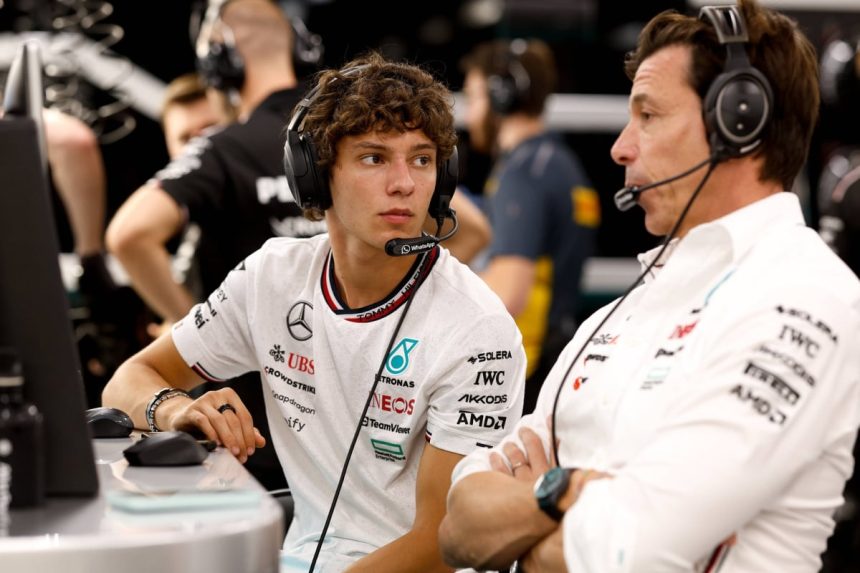F1’s Kimi Antonelli Reacts to Toto Wolff’s ‘Underwhelming’ Cri…read more.
A former Formula 1 world champion has raised serious concerns about the way Kimi Antonelli’s contract situation with Mercedes was handled — suggesting that Antonelli’s move essentially left Mercedes stranded with no viable alternatives for either his seat or that of teammate George Russell.
Earlier this week, Mercedes formally confirmed that Russell and Antonelli will remain the team’s driver pairing for the 2026 season. Russell has already delivered a strong performance in 2025, notching two victories and sitting fourth in the championship standings, while Antonelli has contributed regularly to the team’s push to second in the constructors’ championship.
However — and this is key — the former champion argues that Antonelli’s dip in form over the summer created a situation where Mercedes had no meaningful fallback options. The criticism centres on the belief that Mercedes were delaying commitments on driver contracts because they were still hoping for the availability of four-time world champion Max Verstappen, which further restricted their flexibility.
According to this view, Antonelli’s performance downturn meant Mercedes found themselves effectively locked in: they lacked leverage over the rookie’s contract, and they were equally constrained when it came to Russell’s arrangement. Put differently, Antonelli had left Mercedes with “no option” in terms of driver substitution or renegotiation.
Here are the main threads of the story:
Contract timing and driver market pressures
Mercedes had been cautious in confirming their driver lineup for 2026. Part of this delay was due to the team keeping the door open for a potential signing of Verstappen — which implicitly meant waiting before locking in contracts. Meanwhile, Russell and Antonelli signing new deals simultaneously suggests Mercedes saw both as integral to their future plans. But the former champ argues that once Antonelli’s performance faltered, Mercedes lacked the capacity to pivot.
Antonelli’s summer slump
Antonelli’s early season showed promise — he had built some momentum — yet during the European leg things became more inconsistent. He has openly admitted to losing focus and struggling during the mid-season phase. That slump, the criticism suggests, left Mercedes in a weak structural position: their younger driver hadn’t consolidated, the veteran driver was firm in his seat, and the window for alternative signings had effectively closed.
Strategic gamble with youth
Mercedes had signalled a change in generational strategy. Team principal Toto Wolff had spoken of entering a “new era” with the pairing of Russell and Antonelli. The idea was to bring in a young talent early rather than having them spend years in lesser seats. But that approach carries risk — and according to the criticism, the risk was that by tying themselves down with a young, less-proven driver and delaying alternatives, Mercedes ended up with limited options.
Implications for team flexibility and performance
With Antonelli’s contract sealed and Russell’s future likewise agreed, Mercedes face less flexibility if performance doesn’t pick up. The criticism is that Mercedes’ hands are tied — they either commit to Antonelli for the long term and accept the consequences, or make a change that would be structurally difficult given the contract timing and driver market constraints. This was avoided only because Antonelli and Russell were both confirmed. But the former champ suggests that confirmation was forced by circumstance rather than choice — the “no option” scenario.
Wider significance
This situation raises broader questions about how top teams manage driver line-ups during transitional phases. Mercedes’ gamble on quick youth promotion and simultaneous renewal of contracts might make sense in the long term, but the short term leaves them less agile. The criticism is that by promoting Antonelli quickly and not securing more flexible alternatives, Mercedes have constrained their own ability to respond to changing performance realities.
In short: the former F1 champion’s argument is that Mercedes, by signing both Russell and Antonelli now, have committed themselves without leaving a Plan B — and that Antonelli’s slump effectively removed whatever margin of manoeuvre they might once have had. The team’s driver market options closed off, and the pressure now shifts from contract strategy to pure on-track delivery.
If you like, I can pull together some data on how Antonelli has compared with Russell this season (qualifying vs race pace) and what the possible other driver options were for Mercedes that they might now have missed out on.
